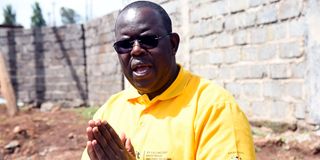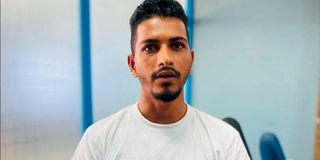Meet the male champions saying no to GBV, saving victims

Joshua Nyolo speaks to Nation.Africa on his role in the war against GBV at Gachororo Health Centre in Juja, Kiambu County on December 6, 2022.
What you need to know:
- Joshua Nyolo says communities are not properly sensitised to GBV issues.
- He has rescued about 25 women and 20 children who are victims of GBV since 2020.
- In Mombasa, Samir Hashim cannot stand cultural stereotypes associated with the GBV war.
- He says social media has created a platform to raise awareness on issues that communities are afraid to speak about.
When Joshua Nyolo lost his wife in 2018, he had no idea how he would raise his two-year-old daughter. Having resigned from his job as a researcher and lost an election, he found himself at a very dark point in his life without the support of close family.
“I decided to raise my daughter on my own. I did not want to give her away to my in-laws because children are supposed to grow up with their parents. Since I was unemployed, I raised her without any assistance, just the two of us,” Mr Nyolo says.
“She was my consolation after losing the MCA election for Ekalakala Ward back in 2017. I used to cry a lot and became depressed, but she gave me hope to continue living.”
When he was finally recalled to work in March 2020 at the onset of Covid-19, it was a God-given second chance to serve his community. Unlike his prior role as a researcher at LVCT Health, today, he is a norms change and community mobilisation officer.
Mr Nyolo says the new role is befitting as he had to be a mother and father to his child after losing his wife. He didn’t mind taking up traditionally ‘women’s roles’ such as changing diapers and bathing his daughter.
“Certain socio-cultural norms perpetuate gender-based violence. For instance, many people assume the man should handle finances, while the woman’s role is child-bearing and rearing. This leaves the woman vulnerable.”
Emotional abuse
He got back to the field during an unprecedented spike in sexual and gender-based violence (SGBV). While rescuing children and women from abuse in Nairobi and Kiambu counties, he encountered some of the most traumatic cases.
“There are several types of GBV; physical, economic and emotional or psychological. Most people are not aware of emotional abuse, yet it is one of the most dangerous forms. It is what causes stress and depression.”
During the 2020 lockdown, Mr Nyolo says he rescued an emotional abuse victim whose case was so severe she had developed mouth ulcers. Her husband was the perpetrator.
“We had to contact the chief at her upcountry home and organise her travel back home. We briefed local authorities to protect her from her abusive husband,” he recounts.
In another case, he rescued a woman from Korogocho slum whose husband had fastened a chain to their bed and was using it to physically assault her. Her husband had also stabbed her with a knife.
“We took her to a safe house outside the county. Sometimes this is necessary because some perpetrators are not even afraid of the local administration. In some cases, we have to take the women and children to safe houses as far as Isiolo.”
Foster parents
On a typical day, he coordinates efforts of community change agents in seven wards within Kiambu County.
“I support them by ensuring that they are well trained, have enough resources to do their work and in difficult cases such as defilement, I accompany them during rescues. This is because most perpetrators are well known to the victims; they could be neighbours or even foster parents.”
Mr Nyolo works with different stakeholders such as local chiefs, the children’s office and police officers. He has rescued about 25 women and 20 children since 2020. However, he explains that some area chiefs and village elders protect perpetrators.
“You would find that a certain chief doesn’t want a perpetrator to be taken to court. They would either dismiss serious crimes such as defilement as family issues or protect them from prosecution because they are well known to them,” he says.
One such case was of a young girl who had been repeatedly defiled by her foster father for almost two years. It has been an uphill task for him to make the chief understand that sexual violence cases should be prosecuted. He reveals that he is even in community leaders’ bad books as they want him to abandon the case.
Bride price
He says communities are not properly sensitised to GBV issues. “Some people don’t believe that there is marital rape. Some women come to me complaining that their husbands have forced them to have sex barely a week after giving birth. The men say that because they paid bride price, they own their wives’ bodies.”
Mr Nyolo believes a power balance in a marriage is the most effective way of ending GBV.
“This means both partners would be equal. For this to happen, women must be financially empowered so that they are not fully dependent on their husbands.”
Going forward, Mr Nyolo wants all stakeholders to be involved in the war on GBV.
“For instance, for a police officer handling the gender desk, they should make sure that due process is followed in investigations and evidence collection. This assists survivors of SGBV to get justice once they go to court.”
Despite receiving death threats from some perpetrators, he remains committed to the campaign and says he would never abandon it for anything.
In Mombasa, a young Muslim man cannot stand cultural stereotypes associated with the GBV war.
“At first I was afraid of how my community would look at me. A young Muslim and the only man in an office full of women trying to fight gender-based violence. Today, I am walking freely dressed in a T-shirt that reads ‘Stop Gender-Based Violence,’” says Samir Hashim during an interview with Nation.Africa.

Samir Hashim during an interview with Nation.Africa. The 25-year-old is breaking GBV cultural stereotypes in Mombasa County.
The 25-year-old describes his journey as one full of experience, challenges and lessons.
“I have learnt a lot while working under the Mombasa County Department of Youth, Gender, Sports and Cultural Affairs. When I joined three years ago, I was a small boy on a mission to learn. Three years later, I cannot emphasise enough how important it is for people to report GBV cases. Once they report, it creates an impact on lives and livelihoods,” says Mr Hashim.
He is currently the senior gender and social development officer in the county.
Mr Hashim says his journey started way back, but community-based organisations only started recognising his work in 2020. His work included women's leadership and empowerment talks and child support awareness.
“The local leaders and organisations would call me to conduct training and educate men on GBV issues,” he says.
When Covid-19 hit, Mr Hashim saw a need to expand his work.
“People were staying indoors following restrictions set by the Ministry of Health. This saw GBV cases increase. It was then that the Mombasa County Government in partnership with other CBOs launched the GBV Situation room.”
The situation room is an office set aside specifically to deal with GBV cases.
GBV awareness
“I am the only male officer in that office. I remember a day when a gentleman came to report a case and he refused to talk to my colleagues, insisting I should be present. He wanted to speak with me because he felt comfortable,” says Mr Hashim.
He says the room brought the needed change because more people started reporting cases.
“We launched an online number as well. People from other counties, as far as Kisumu, would call to report. We have people coming from neighbouring counties to visit us. The office served a purpose, it contributed to creating GBV awareness,” says Mr Hashim.
With time, people learnt more about him and his work and he would be invited to radio talk shows and community gatherings. Even families started relying on him to help solve minor cases.
Kisauni and Likoni have the highest GBV prevalence in the county. He says Kisauni, which hosts a larger population, records the highest number of defilement cases.
“In a month, we would have 30 plus cases and these are only those reported. Some areas are yet to start reporting GBV cases at the office.”
He notes that social media has created a big space for him to raise awareness on issues that communities are afraid to speak about.
Counselling
“I set aside three to four forums where I have Live Instagram sessions to engage people on GBV topics.”
However, it has not been a smooth journey.
“When I ventured into this field, I used to undergo traumatic experiences. I would have a hard time sleeping at night. Going forward, I feel it is important to have counselling for anti-GBV championing or even retreats.”
Recently, Mr Hashim was recognised as among the 100 Most Influential Kenyan Muslims under the Community Service, Philanthropy and Activism category. He has also been recognised as an African GBV warrior in Mombasa County.
He was part of the Mombasa Governor’s Young Leaders Program initiated by former Governor Hassan Joho. Through the platform, he championed GBV matters at the community level.
Mr Hashim’s main goal is to create a safe space for men and break the cultural stereotypes attached to GBV.
“We have trained more men now and they are coming out to report cases. I came to learn that most marriages break because of minor issues that can be solved amicably.”






